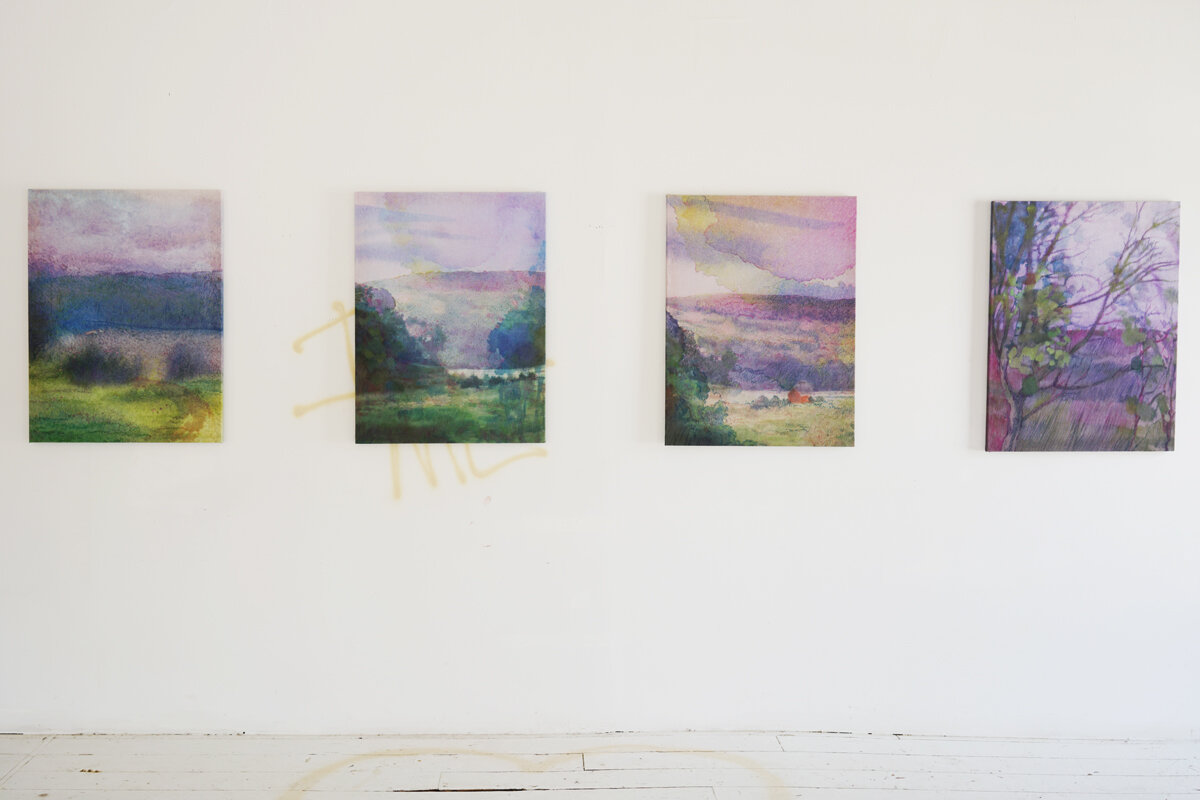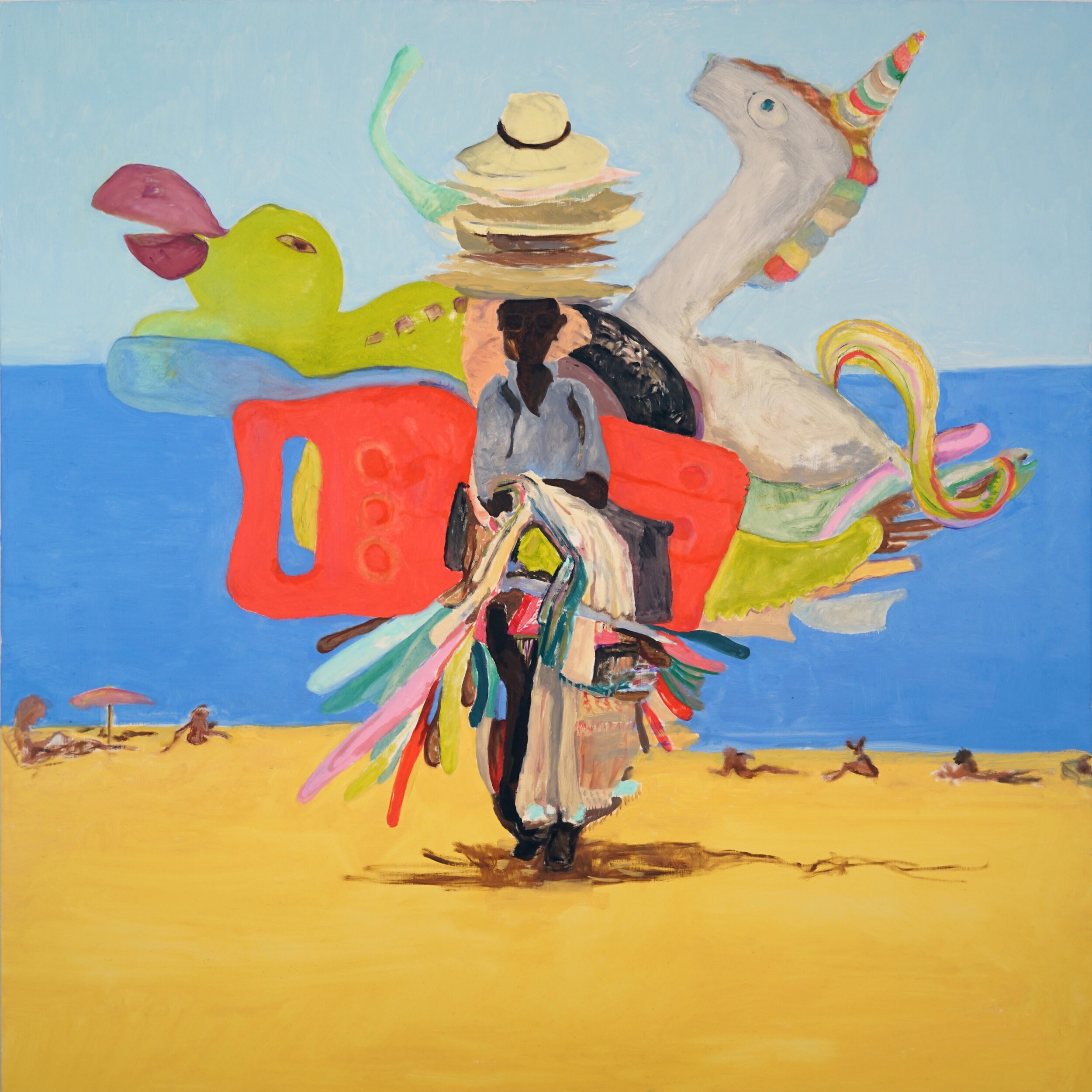Carrying the Weight, War Landscapes is a series of watercolor-on-linen landscapes. The locations were selected based on their historical significance and metaphorical representation in contemporary culture.
Each landscape immerses the viewer in tranquil scenery: a palette of green meadows frames the shallow red waters of the Rubicon River, just south of Ravenna, Italy; a starry night shines into the sea north of Tsushima Island in Japan; a cool and ghostly morning mist fills a Waterloo field in Belgium; a florid orange sunrise floods warm light over the Berezina River in Belarus; the midday sun sends its beams over the rocky Golgotha hill near Jerusalem, Israel; a golden hour brings magical light to the sky over field-lines of Austerlitz in Slavkov u Brna, Czechia; Mannahatta blooms with foliage and dramatic pink clouds hang over Mahicantuck, on the Hudson River; and the dreamy landscapes of Andes lie still in the Catskills region in upstate New York.
No visual trace remains of the dramatic historical events that took place against these backdrops: no Caesar or Napoleon with armies in tow, no horses or warships, no crucifixions; no ravages of war, nor signs of revolt. Only the place-names call to mind these histories, inviting the viewer to imagine their personal battles in place of the old. One thinks of crossing a real-life Rubicon, or point of no return; of an encounter with one’s ultimate obstacle—a Waterloo, of sorts; of feeling unavoidably defeated, as if in the gloom at Austerlitz; of failure— “c’est la Bérézina,” one might cry in French; of an occasion of great suffering figured as Golgotha, or of a battle with the ghosts of memory, animated in Tsushima.
The Lenape people inhabited the land on which I work for thousands of years before the European settlers arrived. They named their island home “Mannahatta,” meaning “Island of Many Hills.” We use the term “Mannahatta” to refer to the island as it was in 1609, and “Manhattan” to refer to the metropolis of today. The river we call the “Hudson,” the Lenape knew as “Mahicantuck,” meaning “river that flows two ways.”
Behind the four landscapes of Andes, NY (where my studio is located), there is the story of the Anti-Rent War of 1839–1845, a collective revolt of farmers who resisted tax collectors and successfully demanded land reform.
Images:
Carrying the Weight, Rubicon River / Carrying the Weight, Tsushima Island / Carrying the Weight, Waterloo Field / Carrying the Weight, Berezina River / Carrying the Weight, Golgotha Hill / Carrying the Weight, Austerlitz Field / 2021, watercolor on printed linen, 52 x 44 inches each / Carrying the Weight, Andes, NY #1 #2 #3 #4 / 2021, watercolor on printed linen, 33 x 25 inches each / Carrying the Weight, Mannahatta #1, 2021, watercolor on printed linen, 64 x 54 inches / Carrying the Weight, Mahicantuck, 2021, watercolor on printed linen, 64 x 54 inches / Carrying the Weight, Mannahatta #2, 2021, watercolor on printed linen, 62 x 54 inches
https://www.alinabliumis.com/caring-the-weight
Symptoms of Plenty
Paintings by Jeff Bliumis
by Sabine Russ
Our Western world’s rampant materialism and consumerism and the resulting destruction of our planet’s ecosystems have become the new millennium’s undeniable reality. One recent positive change is that, compared to a few decades ago, today we are at least talking about capitalism’s excesses, which not only imperil earth’s future and all its lifeforms but create life-threatening conditions for a large part of the world’s population—via the effects of climate change, the results of colonialism and exploitative geopolitics, the plundering and depletion of the planet’s resources, unsustainable waste management, forced migration, and so on.
Everything seems to be in excess today: people, consumption, poverty, plastic, ignorance, hunger, war, greed, anger, fear, exile... with one part of the world indulging in overabundance and privileges, while the other reaps the perils, shortages, and defeat. The habitual immoderation, mindless consumerism, and wastefulness cultivated by our Western market economy are affecting everyone on this planet. And ironically, the disenfranchised, to ensure their own survival, are often forced to become complicit in the global cycle of unsustainable materialism.
Jeff Bliumis’s latest body of work enters exactly there. His exhibition, titled Symptoms of Plenty features several large-scale paintings of “flying vendors” at a Mediterranean beach as observed by Bliumis on a visit there. African refugees looking for work in Europe are often forced to cater to the affluent, thus inadvertently supporting conditions that contributed to their fleeing their home countries, which have become inhabitable due to war, poverty, severe weather, violence and more—all originating in some form of Western exploitation.
The vendors in Bliumis’s paintings emerge like apparitions from the sea (Morning Vendor), literally tethered to their ware of colorful inflatables. In a twist of logic, visually the vendors present excess and riches, wearing multiple hats and being “dressed” in layers of toys, yet underneath they are poor and without a license. Their clients will apply their habitual racist gaze (Sunbather’s Gaze)—they won’t ask about the vendors’ perilous journeys here, let alone contemplate the absurdity of their jobs. The plastic junk they are forced to sell will likely end up in the ocean, completing the ruthless cycle that contributes to refugees’ displacement in the first place. The Evening Vendor walks toward the ocean as if to disappear there with the sun. The vendors’ invisibility as people under their garish ware echoes our daily reality, which favors the pursuit of material desires over meaningful human encounters. Bliumis’s compositions tap into the seductive potential of color and shape—in painting as much as in any commodity.
Symptoms of Plenty also includes several works from Bliumis’s ongoing series of “service paintings” which, like the beach vendors, highlight our entanglements and estrangements in public space. Bliumis paints people who serve us—cab drivers, cooks, waiters, nurses, cleaning personnel, hairdresser—and their patrons. As paying clients we rarely give these individuals a second thought, assuming our monetary transactions suffice. As Bliumis travels through his day, either in New York or other locales, he sketches what he sees, eventually transferring his observations into painting. We might recognize ourselves—as often oblivious patrons, glued to our devices, barely aware of our surroundings, and our body language increasingly adapted to ever-present communication technology. Our excessive use of screens is a reality that is rarely seen in painting.
Consumption is a recurring theme, as restaurants and coffee shops are among Bliumis’s favorite sources of inspiration. Heinz, depicting a MacDonald’s interior, hints at the ubiquitous brands and chains that define our food culture and food war, contributing to systemic discrimination via malnutrition. Cotton Candy is a circle of “missed gazes” around the dilemma of choice in the face of plenty. The stacked plastic coffee cups in Red White and Blue achieve a strange patriotic undertone, not failing to remind of the country that consumes, wastes, and pollutes the most in the world. Noosa takes place at the supermarket register but it’s the abundance of groceries that’s foregrounded while the cashier seems lost in a daydream, staring into the space as if trying to remember if there was a deeper meaning to life than bagging provisions. In Wait, a server turns her back to a chaotic and restless clientele behind her, all of whom appear to be needing something. The server turns to the viewer, as if asking for all the excessive wanting and craving to stop.
Symptoms of Plenty contributes to this SPRING/BREAK art fair’s theme In Excess from a mundane angle, exactly where ordinary excess takes place. Bliumis’s paintings may remind visitors that an increased alertness to the quality of our human interactions and a conscious attitude toward consumption will allow each of us to make a difference.
http://jeffbliumis.com/vendors

